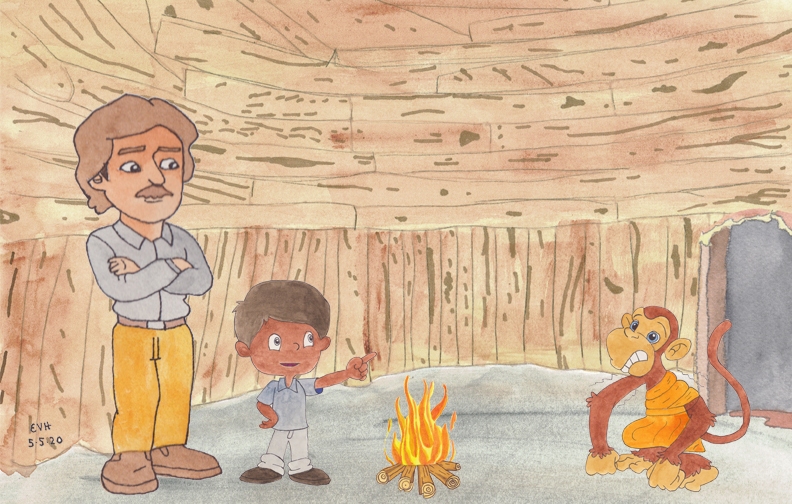
Jataka 250
Kapi Jātaka
The Monkey
as told by Eric Van Horn
originally translated by William Henry Denham Rouse, Cambridge University
originally edited by Professor Edward Byles Cowell, Cambridge University
This is another story in which a monkey disguises himself as a monk in order to find the comfort of a warm fire. Monkeys certainly get a lot of bad treatment in the Jātaka Tales! Am I the only one who has compassion for the cold, hungry monkey?!
“A holy sage.” The Master told this story while he was living at Jetavana. It is about a hypocritical monk.
The Saṇgha found out about his hypocrisy. They discussed it in the Dharma Hall: “Friend, our brother, after embracing the Buddha’s teaching that leads to salvation, still practices hypocrisy.” The Master came into the hall and asked what they were discussing. They told him. He said, “Monks, this is not the only time this monk has been a hypocrite. He was a hypocrite before when he shammed himself simply for the sake of warming himself at the fire.” Then he told them this story from the past.
Once upon a time, when Brahmadatta was the King of Benares, the Bodhisatta was born into a brahmin family. When he grew up and his own son was old enough to run about, his wife died. He took the child on his hip and went into the Himalayas where he became a recluse. He brought up his son in the same life, living in a hut of leaves.
It was the rainy season, and the heaven poured down its floods incessantly. There was a monkey there who wandered about, tormented with the cold, chattering and rattling his teeth. The Bodhisatta found a large log, lit a fire, and lay down upon his bedroll. His son sat by him and rubbed his feet.
Now the monkey had found a robe belonging to some dead recluse. He dressed himself with the upper and lower robe, throwing the cloth over one shoulder. He took a walking stick and water pot and - dressed in this recluse’s robe - went to the leaf-hut to warm himself. And there he stood in his borrowed robes.
The boy saw him and cried out to his father, “See, father! There is a recluse trembling with cold! Call him here. He should warm himself.” Thus addressing his father, he uttered the first stanza:
“A holy sage stands shivering at our gate,
A sage, to peace and goodness consecrate.
Oh father! bid the holy man come in,
That all his cold and misery may abate.”

Figure: Shivering at Our Gate
The Bodhisatta listened to his son. He got up and looked. Then he knew it was a monkey, and he repeated the second stanza:
“No holy sage is he, it is a vile
And loathsome monkey, greedy all to spoil
That he call touch, who dwells among the trees,
Once let him in, our home he will defile.”
With these words, the Bodhisatta seized a piece of burning wood and scared away the monkey. The monkey leaped up and ran off, and whether he liked the woods or whether he didn’t, he never returned to that place any more. The Bodhisatta cultivated the Faculties (1. walking on water or through walls, 2. ESP, 3. telepathy, 4. recollecting previous lives and 5. “the divine eye,” which is seeing peoples’ next rebirth) and the Attainments (jhānas), and to the young recluse he explained the process of the immaterial attainments (infinite space, infinite consciousness, nothingness, and neither perception nor non-perception). Then he, too, let the Faculties and the Attainments spring up within him. And both of them, without a break in their ecstasy, became destined to be reborn in the Brahma realm.
Thus did the Master show how this man was not only then but had previously been a hypocrite. The discourse ended, he taught the Four Noble Truths, at the conclusion of which some reached the First Path (stream-entry), some the Second (once returner), and yet some the Third (non-returner). Then he identified the birth: “The hypocritical monk was the monkey, Rāhula was the son, and I was the recluse.” (Rāhula was the Buddha’s son.)
